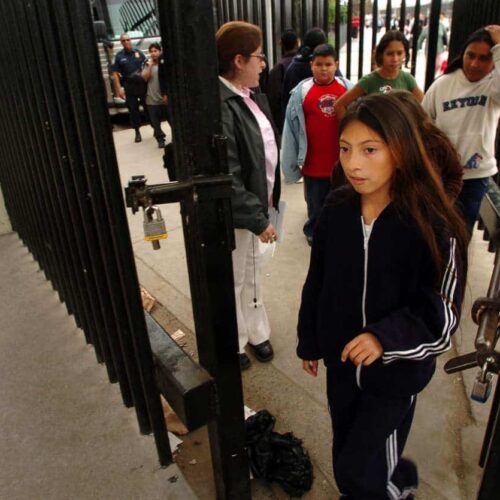Introduction
President Donald Trump recently blamed Democrats for “horrible” laws that set procedures for handling unaccompanied minors apprehended entering the United States. They’re “not all innocent,” Trump also said recently of the minors, many of whom ask for refuge from the same gang violence that Trump says the migrant flow has brought in.
In reality, the U.S. rules for treatment of these minors were set by legal settlements going back to the 1990s, as well as 2008 bipartisan legislation approved unanimously by Congress. As the Center for Public Integrity explained in a 2011 story, kids were ultimately rescued from trafficking abuses because of required safeguards for unaccompanied migrant minors.
Another 2014 Center piece showed how volunteer lawyers help minors through an arduous asylum process of trying to prove they faced extortion, rape and mortal threats in Central America.
The Center’s 2011 story revealed how a volunteer lawyer met a 16-year-old Mexican teen in a Virginia detention center who said Border Patrol agents had suggested he become an informant. The boy told the lawyer that his uncle, who controlled him, forced him to carry a backpack of marijuana over the border. The first time he did it, he came across Border Patrol agents and asked them for protection if he provided information about smuggling. The agents, he said, told him to return to Mexico, gather information and return to provide what he learned.
When the boy encountered agents his third time crossing, he was sent to the Virginia detention center. The lawyer reported his story to U.S. Immigration and Customs Enforcement investigators. The lawyer eventually won refuge for the boy as a trafficking victim. The story also detailed how procedural safeguards helped adults represent a Chinese girl who’d been smuggled into the U.S.
Mexican minors can be voluntarily and relatively quickly deported to Mexico, where welfare officials are supposed to meet them. But the laws that Trump criticized require that U.S. agents interview minors to gauge, initially, if they could face threats once returned.
Kids who are not Mexican or Canadian must be transferred to non-jail shelters before possible deportation, which allows time and a setting for potential meetings with child-welfare specialists or lawyers. All unaccompanied children, advocates argue, including Mexicans, should be provided a chance to speak with non-adversarial adults such as child-welfare and legal experts.
On Wednesday, after a long battle to obtain records, the American Civil Liberties Union released a report disclosing thousands of pages of complaints and other documents related to alleged abuses of unaccompanied minors. The ACLU sued the U.S. government to obtain the complaints, which include allegations of Border Patrol agents tasering, kicking and hitting minors, telling them they’d be raped in jail, denying food and medical care and carrying out inappropriate stripping of clothes and body searches.
In a lengthy statement, CPB called such allegations “baseless,” and said: “CBP strongly disagrees with the assertions and conclusions made by the ACLU report, which equates allegations with fact and flatly ignores reforms made by CBP as well as oversight conducted by outside independent agencies over the last decade. Just in the last three years, CBP has established a number of agency-wide policies that aim to provide for additional protections for those held or detained by CBP. CBP was not contacted by the ACLU regarding its report or any of its findings.”
Read more in Inequality, Opportunity and Poverty
Immigration Decoded
Commentary: Trump’s immigration blame game
Migrants have long assumed costs, risks of border crossing—but Trump’s finger pointing now adds to the burden.
Immigration Decoded
ICE failed to penalize contract immigrant jails with thousands of safety and rights violations
Federal watchdog says contractors failed to report sexual assaults and staff misconduct to ICE investigators.


Join the conversation
Show Comments